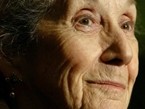Nadine Gordimer, the South African Nobel laureate who used literature to resist apartheid, has died at the age of 90. Gordimer remained productive, and controversial, well into her latter years.
She is being celebrated, and rightly so, for her immense contributions not just to South Africa’s literary world but to the English-speaking world in general. She is also being celebrated for her politics. Three themes stand out amidst the tributes.
1. Gordimer may be celebrated for her politics more than her literature. One of the reasons South Africa’s ruling African National Congress is cheering Gordimer today–when it once jeered fellow South African Nobel laureate J.M. Coetzee–is that she was a loyal member of the ruling party, and adopted its left-wing outlook on the world, especially on the Israeli-Palestinian conflict, where she took a decidedly anti-Israel view.
Gordimer famously argued with fellow Susan Sontag over whether Sontag should travel to Israel to accept the Jerusalem Prize in 2001. As the eccentric biographer Ronald Suresh Roberts–with whom Gordimer later quarreled–noted in No Cold Kitchen, Sontag accepted the prize, over Gordimer’s objections, even though she also counted herself a critic of Israeli policies. Gordimer preferred “justice” to “truth”–politics over literature.
2. Gordimer retained her storytelling ability, and insights into South Africa, into her latter years. Friends and relatives joked that they had often been forced in school–some of the liberal schools even in apartheid South Africa read anti-apartheid authors like Sontag and Alan Paton–to read Gordimer but enjoyed little, and recalled, less, of what she had written. I had the opposite experience when I encountered her work.
In her 2002 novel The Pickup, for example, Gordimer ably captured the ennui of life among the multi-racial elite in post-apartheid South Africa. The main character is a young liberal woman who falls in love with a visiting Arab migrant and follows him back to his home country. She cannot quite accept the strictures of his backward society, so she chooses a different form of the self-effacement she desires, embracing the desert itself.
One might disagree with that choice, which Gordimer seems to romanticize–Coetzee certainly would, and in fact seemed to attack white South African self-effacement in his Booker Prize-winning novel, Disgrace, which finds the main character resigned to a life of euthanizing dogs. Nevertheless, The Pickup was both timely and engaging, as few contemporary novels seem to be. Gordimer’s enduring relevance was her real achievement.
3. Gordimer was right about the most important thing, wrong about many others. It almost goes without saying that Gordimer nailed apartheid, long before it was fashionable to do so. She was undoubtedly a pioneer in that regard–even if post-apartheid South Africa turned out not to be the utopia, political or literary, that many in “the struggle” expected. (Gordimer was located in New York for many of her later years.)
Yet though she was right about apartheid, Gordimer was wrong about Israel and the Palestinians, and wrong generally to draw broad left-wing interpretations from a specific struggle in which the antagonists had the good sense and luck to work out their dispute in liberal democratic, constitutional terms. The notion that a grander imperative of “justice” therefore followed, in art or in politics, was wrong. She will be missed, regardless.

COMMENTS
Please let us know if you're having issues with commenting.